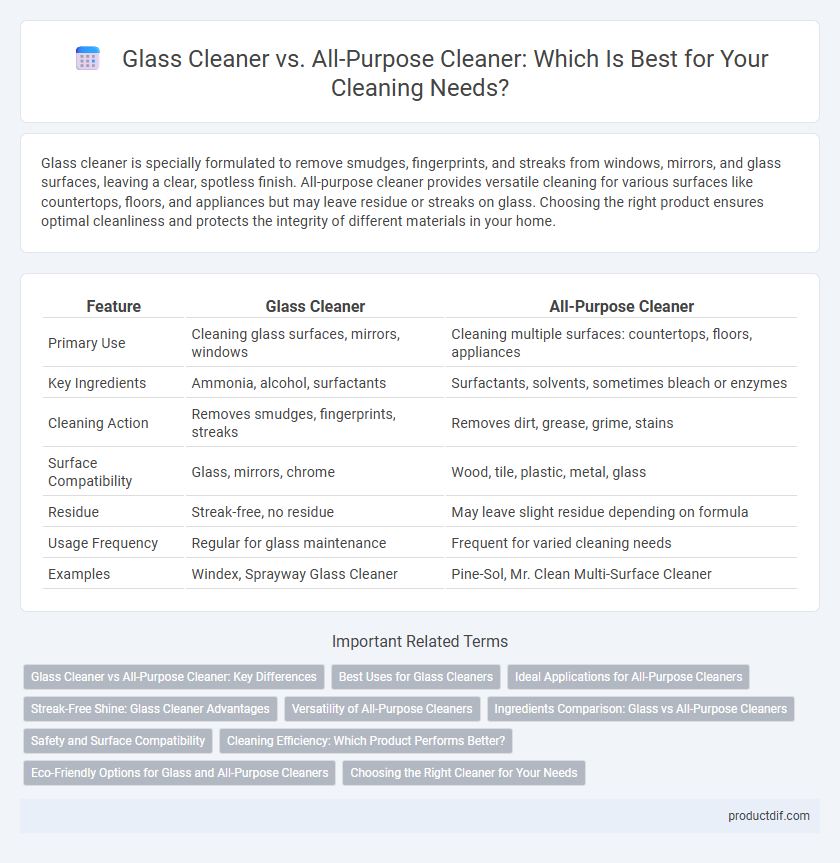Glass cleaner is specially formulated to remove smudges, fingerprints, and streaks from windows, mirrors, and glass surfaces, leaving a clear, spotless finish. All-purpose cleaner provides versatile cleaning for various surfaces like countertops, floors, and appliances but may leave residue or streaks on glass. Choosing the right product ensures optimal cleanliness and protects the integrity of different materials in your home.
Table of Comparison
| Feature | Glass Cleaner | All-Purpose Cleaner |
|---|---|---|
| Primary Use | Cleaning glass surfaces, mirrors, windows | Cleaning multiple surfaces: countertops, floors, appliances |
| Key Ingredients | Ammonia, alcohol, surfactants | Surfactants, solvents, sometimes bleach or enzymes |
| Cleaning Action | Removes smudges, fingerprints, streaks | Removes dirt, grease, grime, stains |
| Surface Compatibility | Glass, mirrors, chrome | Wood, tile, plastic, metal, glass |
| Residue | Streak-free, no residue | May leave slight residue depending on formula |
| Usage Frequency | Regular for glass maintenance | Frequent for varied cleaning needs |
| Examples | Windex, Sprayway Glass Cleaner | Pine-Sol, Mr. Clean Multi-Surface Cleaner |
Glass Cleaner vs All-Purpose Cleaner: Key Differences
Glass cleaner is specifically designed to remove smudges, fingerprints, and streaks from glass surfaces using ingredients like ammonia for a streak-free shine, while all-purpose cleaner contains more general cleaning agents to tackle dirt and grime on multiple surfaces such as countertops, floors, and appliances. The pH level in glass cleaners tends to be neutral or slightly alkaline to preserve glass integrity, whereas all-purpose cleaners vary widely in pH depending on their intended use, making them less suitable for delicate glass surfaces. Glass cleaners typically leave no residue, enhancing clarity, whereas all-purpose cleaners may leave a film that requires additional wiping for clear glass.
Best Uses for Glass Cleaners
Glass cleaners are specifically formulated to remove smudges, fingerprints, and streaks from glass surfaces such as windows, mirrors, and glass tabletops. They contain ingredients like ammonia or alcohol that evaporate quickly, ensuring a streak-free shine and clarity that all-purpose cleaners may not provide. For surfaces requiring transparency and spotless appearance, glass cleaners offer superior performance compared to all-purpose cleaners.
Ideal Applications for All-Purpose Cleaners
All-purpose cleaners are ideal for tackling a variety of surfaces including countertops, appliances, floors, and bathroom fixtures, making them versatile for everyday cleaning tasks. They effectively remove grease, dirt, and grime from materials such as laminate, tile, and sealed wood without causing damage. Unlike glass cleaners, which are formulated specifically for streak-free window and mirror cleaning, all-purpose cleaners offer broader utility in maintaining cleanliness across multiple areas in homes and offices.
Streak-Free Shine: Glass Cleaner Advantages
Glass cleaners are specifically formulated with solvents and anti-streak agents that evaporate quickly, ensuring a streak-free shine on windows and mirrors. Unlike all-purpose cleaners, glass cleaners minimize residue and smudging, enhancing transparency and clarity. Their specialized ingredients target grease and fingerprints without dulling surfaces, making them ideal for maintaining pristine glass finishes.
Versatility of All-Purpose Cleaners
All-purpose cleaners offer exceptional versatility by effectively tackling a wide range of surfaces, including countertops, appliances, and floors, unlike glass cleaners that specialize solely in streak-free window and mirror cleaning. Their multifunctional formulation eliminates the need for multiple products, saving time and storage space while maintaining cleanliness throughout the home. This adaptability makes all-purpose cleaners a practical choice for comprehensive household cleaning tasks beyond just glass surfaces.
Ingredients Comparison: Glass vs All-Purpose Cleaners
Glass cleaners typically contain ammonia or alcohol-based solvents like isopropanol for streak-free shine and rapid evaporation, whereas all-purpose cleaners often include surfactants, alkaline agents, and biodegradable solvents to tackle a wider range of dirt and grease. The pH level varies significantly; glass cleaners are usually neutral to mildly alkaline to avoid damaging glass surfaces, while all-purpose cleaners can be more alkaline to enhance grease-cutting power. Fragrance and dye content in all-purpose cleaners tend to be higher to mask strong odors, unlike the mild or unscented composition of most glass cleaners.
Safety and Surface Compatibility
Glass cleaners often use ammonia or alcohol-based formulas that effectively remove streaks but can be harsh on sensitive surfaces and produce strong fumes, requiring good ventilation and careful handling. All-purpose cleaners tend to have milder ingredients designed for versatility, making them safer for a wider range of surfaces including plastics, countertops, and painted finishes without causing damage or discoloration. Choosing the right cleaner depends on the specific surface material and the need to minimize exposure to potentially irritating chemicals for both user safety and surface preservation.
Cleaning Efficiency: Which Product Performs Better?
Glass cleaners contain specialized surfactants and solvents formulated to dissolve grease and grime without leaving streaks, ensuring crystal-clear surfaces. All-purpose cleaners offer versatility but may leave residues or streaks on glass due to their broader chemical composition. For optimal cleaning efficiency on glass surfaces, glass cleaners outperform all-purpose options by providing streak-free shine and targeted grime removal.
Eco-Friendly Options for Glass and All-Purpose Cleaners
Eco-friendly glass cleaners typically use plant-based ingredients and biodegradable formulas that leave streak-free finishes without harsh chemicals. All-purpose eco-friendly cleaners often contain natural surfactants and essential oils, offering versatile cleaning power suitable for multiple surfaces while minimizing environmental impact. Choosing biodegradable packaging and certifications such as EPA Safer Choice further ensures sustainable and non-toxic cleaning solutions.
Choosing the Right Cleaner for Your Needs
Glass cleaner is specifically formulated with ingredients like ammonia or vinegar to effectively remove streaks, smudges, and fingerprints from glass surfaces, providing a sparkling, residue-free finish. All-purpose cleaner contains versatile surfactants and detergents designed to tackle dirt, grease, and grime on a variety of surfaces including countertops, tiles, and appliances, but may leave streaks on glass. Selecting the right cleaner depends on the surface material and cleaning goals, with glass cleaner ideal for mirrors and windows, while all-purpose cleaner suits everyday cleaning across multiple household areas.
Glass cleaner vs all-purpose cleaner Infographic

 productdif.com
productdif.com